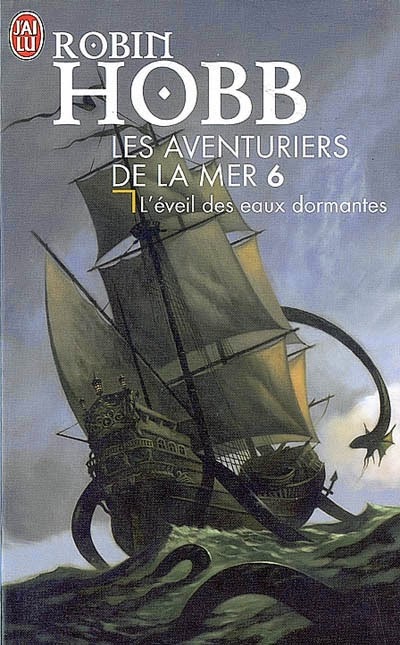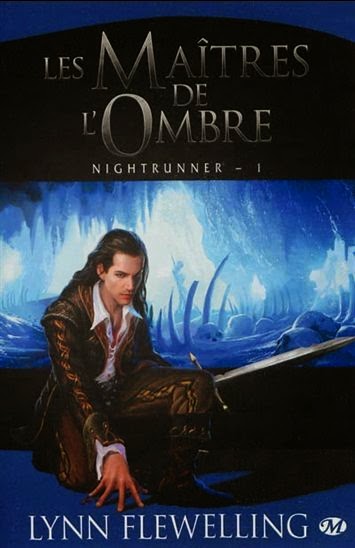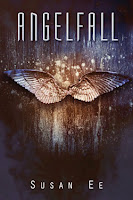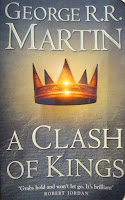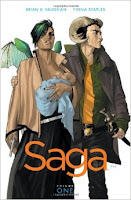AUTEURS' LIBRARY
Austen Jane
(1)
Barrie J. M.
(1)
Bowen Elizabeth
(1)
Cooper James Fenimore
(2)
Cronin A.J.
(2)
Dostoyevsky Fyodor
(1)
Ee Susan
(2)
Farland David
(1)
Fitzgerald F. Scott
(1)
Flewelling Lynn
(1)
Forster E. M.
(2)
Gaskell Elizabeth
(1)
Golding William
(1)
Grahame Kenneth
(1)
Harpman Jacqueline
(3)
Hobb Robin
(5)
Ishiguro Kazuo
(1)
Le Guin Ursula K.
(2)
London Jack
(1)
Martin George R. R.
(3)
Melville Herman
(1)
Murail Marie-Aude
(1)
Ngῦgῖ wa Thiong’o
(1)
Pilcher Rosamunde
(1)
Ryan Anthony
(2)
Salinger J. D.
(1)
Shaw George Bernard
(2)
Stegner Wallace
(2)
Steinbeck John
(1)
Stevenson Robert Louis
(2)
Tarkington Booth
(1)
Vaughan Brian K.
(1)
Webb Mary
(2)
Wharton Edith
(1)
Friday, 7 November 2014
Robin Hobb- Fool's Assassin, chronique II
From 262 onwards.
Much much better than the first 262 pages : the
fantasy becomes present in the background, all at the same time as the action
finally sweeps in, the writing finds grounds on which to build, and ‘secondary’
characters are finally put to a use.
Almost excellent for the way it works within
the confines Hobb defined. That is, you don’t really get your Fool, and, you
might as well know it, Fitz will be really, really, distant (that’s my one big
reproach for this second part), but instead of falling into despair, you start
warming up to those characters you do get, even if they’re new ones. Or cooling
down.
I have to
swallow some of my earlier statements, especially regarding Bee: I may have been
too hasty in judgment…or the book too long in setting up a path that could make
our judgment more favourable for that particular character. Did we really need a
100 pages of detailed childhood showing us Fitz, Molly and Bee all in negative
light? Having said that, the second and third parts of the book (from 262 onwards) more
than repair the lacks in characterisation: Bee is well-developed thanks to a
proceeding that, I have to confess, really annoyed me at first (she becomes a
narrator), but that I finally came to accept. It was the wise way to do it,
anyway_ considering the narrative size that this particular character will take
on.
We can note, however, that Chade and Nettle
mostly intervene to piss Fitz off like a bunch of spoiled brats, and Kettricken
and Dutiful almost not at all. It’s first and foremost about Bee, then Fitz,
then Riddle, and, unfortunately for everybody, Shun and FitzVigilant. Boy, did
Hobb master her portrayal there, or what ! You will want to throw the book to
the other side of the room. As usual, it takes an incredible long time for Fitz
to realise he must handle once and for all the trifles of his life before they
take on an importance of themselves and actually disrupt what really matters (and
thereby make the plot happens). All of this Bee-Shun-Lant plotline would not be
credible if it wasn’t for our knowledge of Fitz’s cluelessness.
Now, it's obvious, particularly regarding Shun, that those characters will directly or indirectly have an impact on the intrigue of the following books, and Hobb doesn't really make a secret of it. So with the intrigue around Bee. There's no real big revelatory "ha!" because we felt it develop chapter after chapter. The interest of this book will be in the way we come to discover this not-so-big revelation!, the narration itself rather than the action, but you will be turning the last page wondering: "what's going to happen, now?"
Wednesday, 5 November 2014
Robin Hobb- Fool's Assassin, chronique I
First draft, up to page 262.
Something was lost. In this attempt to soften the grounds between the best of the early Fitz saga and the worst at which it left the scene, something was truly lost. The style is the same, the characters we love are all present, save one who is treated with the least respect imaginable considering its importance all throughout Fitz’s saga (you’ll see)…Yet, my interest could never be captured. At some point, a 100 pages down, I had to admit to myself that I was reading only to see when it would get better. Imagine reading a book in which most of the characters piss you off or bore you to death and the hero, the one you truly love_ the one for whom you went ahead, paid 35 euros saying ‘ok, one more time. You never know…’ _is lost in their web of everyday boredom and yes, I’ll say it, misery. Save for two or three, the 250 first pages of this book are not worth our time.
the fantasy :
Hobb does it on purpose, I suppose; she shows us Fitz’s life as he convinced himself he had always wanted it, yet does that mean we want it? That we have to suffer through it, page after page?
He doesn’t live anything, his life is peaceful, ok we get it! But that could have been said in 100 pages much more worth our notice and the book been less repetitive, a little less long (and at the same time saved some of our money). Fitz has the nasty tendency to confuse between peaceful and boring to the point where his 'peace' eats him up, but that too we got a long time ago! I understand that scenario-wise she had to make the beginning really long to justify certain ‘events’ in order to then allow the events we’re really looking for to occur; and she wanted to do right by a few characters, I believe, but she ended up being diverted from the task I understood those books would be about. I mean, it’s a fantasy book, and I, for one, am still looking for the fantasy…But I know now I own a perfect guide if I ever want to know more on the country life of the gentry in fantasy...
All the scenario tricks that could be pulled together take more than a Hobbest long time to be laid out and as of now, none got pulled, yet ! Simply put, nothing happens, nothing of what does occur evolves, nothing changes for 250 goddamn pages…surrendered by the very people we thought we would flee in picking up this new part of the saga, seductively called ‘Fitz and the Fool’.
the characters:
Well, where is he? If it’s going to be only a trilogy (as wikipedia says), then I expect we won’t see enough of the Fool, for already more than a third of the first book has been wasted. I don’t care for Molly (ironically, this was the last chance to redeem her a little bit in our mind and instead she’s portrayed as even more ludicrous), for Burrich’s children (better had she left Burrich alive and never got his children to be born, for why kill a character that works and replace him by six or so that don’t?), not much for Bee as she is now (are we supposed to be touched by her relationship with Fitz ? Because for that effect, we would have had to be introduced to that character much before to be able to care for her, and not meet her out of the blue as a mere tool to move the plot forward. It's Fitz we care about, not Bee!), and not much for Nettle as she’s presented here: without depth, devoid of anything that could tempt our interest. Dutiful, Kettricken, Elliania, Chade, and so on, multiply their apparitions but only to deliver two or three bland sentences and to satisfy the reader with the minimum requirement for their presence.
the writing:
Too much is based on atmosphere and emotions, two things Hobb could always master successfully, two things she and we always counted on when picking up one of her books, yet here she seems to have lost that talent. For the few pages where she manages to trigger an emotion in us or a feeling of home in her beautiful sentences, most of the others are wasted on long descriptions of melancholic nature in a place (Withywoods) where the place itself and its characters are utterly devoid of it. Try as you might, how can a writer extract a powerful sensibility from characters (Molly and her children) that she took so long to portray as dry as a bone? The skills she generally excels in cannot be put to good use so long as Fitz remains refrained from any experience that could trigger his feelings in the first place.
Having said that, I want it to be better, I so want it, and expect it will be, since the other side of the duet has not yet entered the scene. So this negative critique only concerns the first part of the book, let's hope I turn my critique completely upside down by the time I close the back cover.
Tuesday, 21 October 2014
Auteur's library
E. M. Forster
A Passage to India
1924
This is only a passage, indeed, one route at the end of which there is no single truth to rely on. There is no British India without Indians in this work and you are asked to empathise with their multiple faces as Indians and as people, rather than revealed "the truth" about India under the British Raj.
Though ever so present, the writer never takes over the story but lets the characters play it for you. Forster creates a fantastical, yet subtle, Dr. Aziz that he clearly loves. You respect him, you feel for him after the first few sentences and you know it's his shine that will carry the story. With an uncomplicated, slightly ironic style, A Passage delivers beauty of form and content that is at times subdued, at times overt, a mélange of spirituality and profound realism, a balance between the Oneness that belittles our performances and the importance of those little selves. A balance between Forster's message 'Only connect...' and the road of racial prejudices and ambivalences it takes to get there. 'Only connect' but do not negotiate the underlying truth of colonialism. A Passage to India judges without saying so.
P.S. Forster's 'Only Connect...' was the epigraph of Howards End.
Tags: feminist representation of the housewife, early 20th century, a little of that ladies & gents' courtship dance, social castes of British India, racial intercourse under the British Raj, hypocrisy of codes of conduct, drama in close quarters, mystical take on destiny, religion, Islam, Hinduism and India, hints of more than platonic homosociality, colonialism and independence, religious mysticism, national identity and Britishness, race and friendship, Oneness vs. selves..., or is it?, Overpowering nature
A Passage to India
1924
This is only a passage, indeed, one route at the end of which there is no single truth to rely on. There is no British India without Indians in this work and you are asked to empathise with their multiple faces as Indians and as people, rather than revealed "the truth" about India under the British Raj.
Though ever so present, the writer never takes over the story but lets the characters play it for you. Forster creates a fantastical, yet subtle, Dr. Aziz that he clearly loves. You respect him, you feel for him after the first few sentences and you know it's his shine that will carry the story. With an uncomplicated, slightly ironic style, A Passage delivers beauty of form and content that is at times subdued, at times overt, a mélange of spirituality and profound realism, a balance between the Oneness that belittles our performances and the importance of those little selves. A balance between Forster's message 'Only connect...' and the road of racial prejudices and ambivalences it takes to get there. 'Only connect' but do not negotiate the underlying truth of colonialism. A Passage to India judges without saying so.
P.S. Forster's 'Only Connect...' was the epigraph of Howards End.
Tags: feminist representation of the housewife, early 20th century, a little of that ladies & gents' courtship dance, social castes of British India, racial intercourse under the British Raj, hypocrisy of codes of conduct, drama in close quarters, mystical take on destiny, religion, Islam, Hinduism and India, hints of more than platonic homosociality, colonialism and independence, religious mysticism, national identity and Britishness, race and friendship, Oneness vs. selves..., or is it?, Overpowering nature
Thursday, 16 October 2014
Auteur's library
 William
Golding
William
Golding
Lord of the
Flies
1954
This is not the kind of book you could ever like reading: it’s not pleasant, feels as if it's not meant to be so. It’s that one necessary stone in the wall of your education. Going through each scene is like a dare, unnerving, frighteningly thrilling. You feel the next drama coming round the corner, you fervently turn the pages and tell yourself it's just to be done with it, leave that godforsaken island behind you.
The book really shook me, though I never managed to love the characters. I couldn’t help but hope they would be saved, all the while wishing those evil kids’d be dead, already. It is impossible not to hate them but it’s equally as hard, I find, to let go of them.
As Golding blurs the
lines between sanity and madness, wrongness and evil, the characters'
distinctiveness is forgotten 'til they all embody the figure of 'the
boy', or more simply 'the human', in its most banal, yet scariest form. This is where Golding truly nails it: this, the subdued but powerful writing whispers, this could be you.
P.S. The N-word is present around page 200. and used by a kid for a nasty comparison between disorder and order, “savages” and Englishmen.
P.S. The N-word is present around page 200. and used by a kid for a nasty comparison between disorder and order, “savages” and Englishmen.
Sunday, 12 October 2014
Auteur's library
The Runelords
The Sum of
All Men. I.
1998
1998
A good
book, one that I would have loved to love, but ultimately couldn’t.
First, the racial divide: the “Arabic” people are uniformly hard, servile and stupid_ the bad asses of the tale_ while the Whites are in 3D, with varied personalities_ the victims. If fantasy is to represent the physical and cultural races of our world so obviously, then it may want to show some respect in doing so and grant each and every one human with credibility. Too often did this first volume read like a nod at the great patriotic flag of whiteness.
Beyond this, imagine the board of a fantasy game with great obstacles, cards of power, heroes and foes, and a complete inventive lore at hand to make you truly get into it. The systems of endowments, the Days, and the House of Understanding work to form a clever and deep context that really sets the story going. Too bad, then, that in this first book Farland never tackles them too seriously. From one adventure in the woods to the next, the pages read fast, too fast to let you ponder the underdevelopments and the character complexity that should have necessarily flowed from them, yet didn’t. All in all, The Sum of All Men lays the ground for achieving an emotional and philosophical masterpiece, but never reaches.
First, the racial divide: the “Arabic” people are uniformly hard, servile and stupid_ the bad asses of the tale_ while the Whites are in 3D, with varied personalities_ the victims. If fantasy is to represent the physical and cultural races of our world so obviously, then it may want to show some respect in doing so and grant each and every one human with credibility. Too often did this first volume read like a nod at the great patriotic flag of whiteness.
Beyond this, imagine the board of a fantasy game with great obstacles, cards of power, heroes and foes, and a complete inventive lore at hand to make you truly get into it. The systems of endowments, the Days, and the House of Understanding work to form a clever and deep context that really sets the story going. Too bad, then, that in this first book Farland never tackles them too seriously. From one adventure in the woods to the next, the pages read fast, too fast to let you ponder the underdevelopments and the character complexity that should have necessarily flowed from them, yet didn’t. All in all, The Sum of All Men lays the ground for achieving an emotional and philosophical masterpiece, but never reaches.
P.S. That
Iome character is one insufferable girl. 5 pages after meeting her, I started
to call her ‘Princess Useless’.
Subscribe to:
Posts (Atom)



